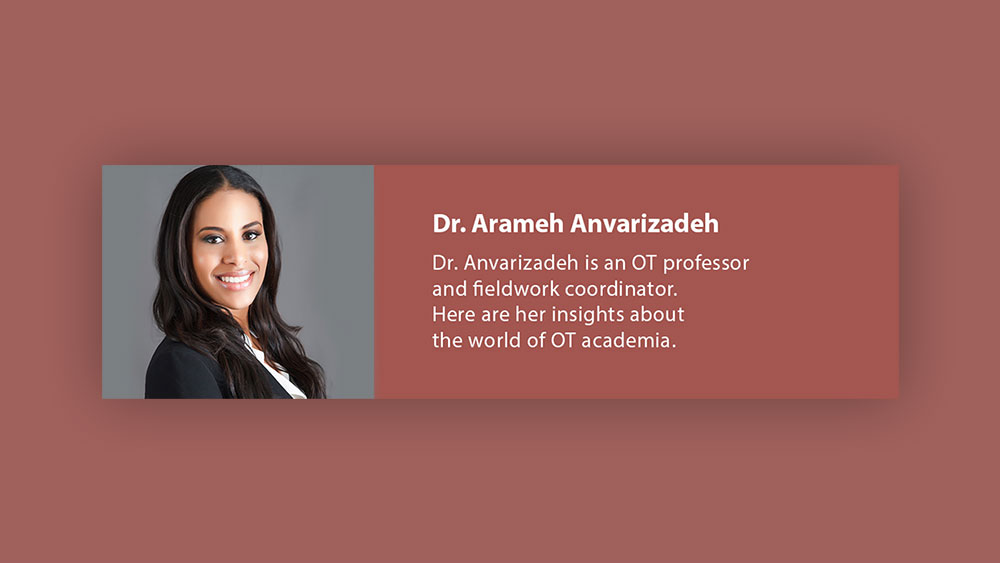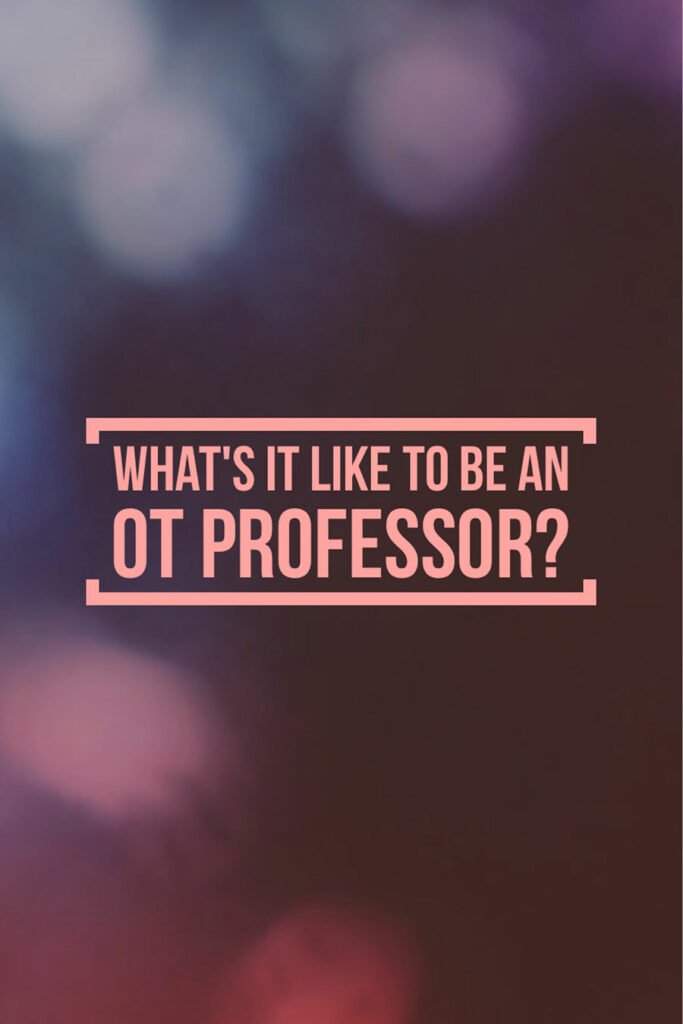
I would guess that at some point along the way almost every occupational therapy practitioner entertains the idea of teaching…whether just taking on one class or entering into academia full-time.
I am thankful to Arameh for taking time to answer some questions about her experience teaching OT. Hopefully, her answers will inspire you and perhaps guide your own thinking about taking on the incredibly important challenge of teaching new OTs.
Interview with Dr. Arameh Anvarizadeh, OT Professor and Fieldwork Coordinator

Potential: What initially drew you to work in academia?
I had been practicing for quite a few years and would often take fieldwork students. I enjoyed the teaching aspect of it. I was then approached by a university to teach an occupational science course as an adjunct professor. That was my first time teaching. It was a great opportunity and new challenge. It was also still a good balance as I was able to practice full-time and teach one class which was online. I taught that class for 4 years.
Around the same time, I was asked to guest lecture about being a leader in the profession, specifically transitioning from a student to practitioner. That lecture led to an opportunity to become a professor and academic fieldwork coordinator. I never thought I would completely leave practice and was not necessarily looking for a new job, but I am always interested in growing professionally especially in different areas, such as academia. I looked at academia as a dynamic and fulfilling new chapter.
What is your favorite part of being an occupational therapy professor?
Mentorship and having the students think about the ‘big picture’. I love making the students think about how valuable our profession is to all populations from non-traditional to traditional settings. I want the students to understand their role in being an OT leader and challenge them to create new niches for our profession. I love seeing the students light up when thinking of fascinating ideas and I like to push them to take ownership by developing and then implementing those ideas.
What is the best part of being an OT fieldwork coordinator?
Providing students the opportunity to be exposed to different practice areas. Advocating for their education and challenging them to set high expectations toward fieldwork success. Teaching them about professionalism as well as critical thinking, but also showing them that OT can be in settings they would least expect. Showing the students the importance of developing therapeutic rapport and cultural awareness. Preparing students to also understand the significance of becoming a fieldwork educator and a lifelong learner.
What is the biggest challenge of teaching occupational therapy?
A primary challenge of teaching is to make sure the material is relevant and relatable. I have to make sure I address students’ questions, give them enough time for activities in class, work on developing clinical reasoning skills within the allotted class time. Sometimes we get in a flow which is good, but also can be a challenge to present all of the material.
What is the biggest challenge of serving as a fieldwork coordinator?
There are not enough OTs willing to take students which limits opportunities and learning experiences. It can be extremely challenging to get sites that students want in the required timeframe.
How do you balance the demands of a private practice and your academic work?
Balance is truly key. I stay very organized to prevent myself from getting overwhelmed. I maintain a certain amount of private clients and make sure not to exceed it. I also primarily see my clients on the day I am not in the office. It is so important for me to maintain my therapeutic relationships with my clients as well as continue expanding my clinical skills.
I sometimes see grumblings online about the disconnect between academia and clinical practice. Have you found there to be a disconnect?
Since I am the newest professor who has been out of (daily) practice for a year now, I still feel very connected to the clinical side of OT. Since I am also the fieldwork coordinator, I am talking to sites, completing site visits, building relationships with facilities, OT leaders, and practitioners daily. I am able to work alongside practitioners to create unique fieldwork experiences, which is why I can still remain connected when teaching. I am also very involved with OT leadership so I often work with OTs who are in clinical practice. This also helps me stay current and understand the pressing clinical issues. However, I can see if someone is completely removed from clinical practice can possibly be disconnected.
What changes do you hope to see in the occupational therapy school experience in the next 5-10 years?
I hope to see more curriculum focused on cultural humility and fluidity. More activities around decreasing health disparities in all communities. I would like to see more interdisciplinary collaboration among healthcare professions such as physical therapy, speech pathology, etc. I also like to see more priorities in recruiting a diverse student body as well as leadership courses that establish OT advocates from the beginning of their graduate studies.
What resources have you utilized to grow as an occupational therapy professor over the years?
I have utilized mentorship, textbooks, continuing education courses, course evaluation feedback, personal reflection, and collaborated with colleagues/other professors to foster ongoing growth.
What advice would you give to a student who hopes to eventually work in academia?
Be passionate about occupational therapy; be passionate about the future; embrace your role in molding future leaders and thinkers. Be prepared to learn from students and enjoy the challenge of teaching. Don’t take yourself so seriously; always have a sense of humor. Never forget that at one time you were sitting right in the classroom just like your students.
What advice would you give an OT practitioner who is just starting to teach…perhaps in an adjunct capacity?
Know your university’s vision, mission, and expected learning outcomes. Make sure to align your curriculum with the program learning outcomes. Be organized and prepare your lessons ahead of time. Even though you are adjunct and might only teach a course, it is important to embrace your role as an educator.
Dr. Arameh Anvarizadeh is an alumna of the University of Southern California (USC), receiving her BS, MA, and Doctorate in Occupational Therapy with a minor in Neuroscience and an emphasis in Ambulatory Healthcare. She is an experienced pediatric therapist who during her time at California Children’s Services (CCS) was responsible for evaluating and treating children living with neuromuscular and orthopedic disabilities. Her current role is academic fieldwork coordinator and professor at West Coast University in Los Angeles. She also is an OT consultant, has a growing private practice, and holds an adjunct faculty appointment at Howard University in Washington, D.C. USC Mrs.T.H. Chan Division of Occupational Science and Occupational Therapy selected Dr.Anvarizadeh to be an intervener for the Pressure Ulcer Prevention research study.
She currently holds leadership positions on both the Occupational Therapy Association of California (OTAC) and the American Occupational Therapy Association (AOTA) as the Communications Chair and the California Representative for the Representative Assembly, respectively. She is an AOTA Emerging Leaders Development Program mentor and serves as a member on OTAC’s Advocacy and Government Affairs Committee, as well as, the Centennial Float Committee. Dr. Anvarizadeh is a founding member of the Coalition of Occupational Therapy Advocates for Diversity (COTAD) where her work focuses on increasing diversity in the workforce and creating dialogue about cultural humility.
She is a recipient of OTAC’s Janice Matsutsuyu Outstanding Service Award and an accomplished speaker who has lectured in both state and national conferences, as well as internationally in 2014’s World Federation of Occupational Therapists’ (WFOT) congress. Dr. Anvarizadeh also serves on the boards of Inclusion Clubhouse and Black Women for Wellness. She is passionate about building healthy communities through inclusion, health education, empowerment, and advocacy. She envisions creating sustainable communities through social entrepreneurship and policy using an occupational therapy perspective.

2 replies on “What’s It Like To Be an OT Working in Academia?”
If you were to complete the classes that certain schools have for pre-occupational theraphy , would you be able to take the board exam to become a ota while still wanting to get a master’s in Ot . ?
Undergrad pre-occupational therapy programs help you complete the pre-requisites for OT school, and would not qualify you to sit for a COTA board exam. (To my understanding.) If you decide to pursue an associates degree as a OTA, there are bridge programs to becoming an OTR down the road. Here is a good overview of the pros and cons of taking this approach: https://www.myotspot.com/transition-cota-otr/